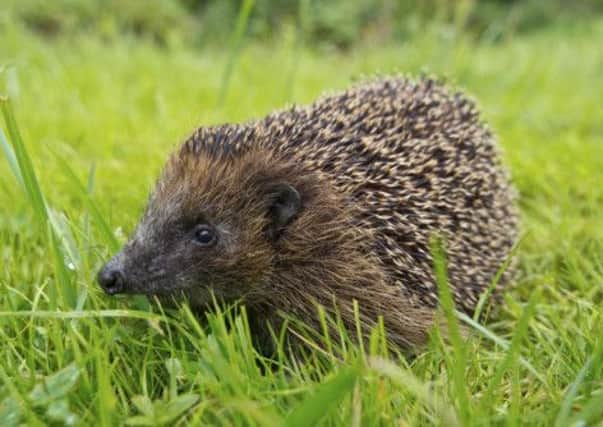Call for gardeners to create safe havens for our wildlife


Anyone who has been gardening for a few years is likely to have noticed that, as time moves on, the wildlife once found in British gardens is becoming a much rarer sight.
In May, the State of Nature report compiled by 25 wildlife organisations found that, for a range of reasons such as the loss of habitat, 60 per cent of the 3,148 UK animal and plant species assessed have declined in the past 50 years.
Advertisement
Hide AdAdvertisement
Hide AdHedgehog numbers have reduced by a third since the millennium.
There are now fewer than one million hedgehogs, the creature immortalised by Beatrix Potter, left in the UK, down from an estimated two million in the mid-1990s and 36m in the 1950s.
The decline is the result of habitat loss, poor management of hedgerows and fragmentation of habitat, owing to new roads, housing and other developments. Tens of thousands of hedgehogs are killed by road traffic each year and similar threats are facing other species.
Tortoiseshell butterflies, once common in gardens, have declined by 77 per cent and Britain’s bird populations have also taken a hit.
Advertisement
Hide AdAdvertisement
Hide AdLast year the RSPB’s annual wildlife survey recorded the lowest number of starlings for 30 years with the average number of the birds spotted by those who took part dropping from 15 to just three.
While research into the reason for the decline is continuing, studies so far have pointed to a decline in traditional, established pastures as a major threat to starling populations.
“What’s most alarming is that many of the ‘common’ garden species – hedgehogs, house sparrows, starlings and common frogs, for example – are becoming much less common,” says Helen Bostock, Royal Horticultural Society (RHS) horticultural advisor. “Historically these species have done well in our gardens and so their decline is something we really need to sit up and take notice of.
“This is where gardeners can make a difference and help to halt the declines we’re seeing by making their gardens more wildlife friendly. This should be a wake-up call to all of us.”
Advertisement
Hide AdAdvertisement
Hide AdWith this in mind, the RHS and The Wildlife Trusts are spearheading a new initiative called Wild About Gardens Week. The event, backed by celebrity gardeners Diarmuid Gavin, Matthew Wilson and Sarah Raven, runs from October 25 to 31 and is urging the public, plus the RHS’s 3,300 community gardening groups, 17,250 schools and 145 partner gardens, to hold wildlife gardening events during the week.
Chris Baines, vice president of The Wildlife Trusts, says: “The nation’s gardens are hugely important for wildlife and as a habitat network they are second to none.
“Inner-city balconies and courtyards, the suburbs’ hedgerows and lawns and the orchards and allotments of market towns and villages all have the potential to be incredibly rich habitats for wildlife.
“There are many simple ways in which we can make our gardens naturally richer.
Advertisement
Hide AdAdvertisement
Hide Ad“Nest boxes, birdfeeders, log piles, nectar plants, fruiting shrubs, wall climbers and ponds all improve the life chances for many garden creatures and, as each of us improves our garden habitat for wildlife, the plants and animals that we attract will bring more pleasure in return. It’s a win-win situation.”
Throughout Wild About Gardens Week, talks and events will be held at Wildlife Trust visitor centres and the four RHS Gardens, including Harlow Carr. The Harrogate gardens will be holding a series of workshops on building everything from bat to bird boxes and there will also be wildflower seed giveaways by the trust and the public will be asked to “Do One Thing” – whether to create a pond, build a hedgehog house or simply put out some bird seed.
“Nature isn’t particularly tidy – the countryside is full of piles of leaves, rotting wood, dying plants, nooks and crannies,” says the gardener and broadcaster Matthew Wilson, better known as The Landscape Man.
“Taking a more relaxed and less tidy approach to our own gardens benefits wildlife by providing similar habitats and food sources. In turn this keeps the garden more balanced and a lot more healthy,”
Advertisement
Hide AdAdvertisement
Hide AdThe Wildlife Trusts and the RHS will be offering free advice and resources via the website www.wildaboutgardens.org.uk and via the RHS Advisory Service.
A microsite (www.rhs.org.uk/wildaboutgardensweek) has been set up for groups and individuals to log events and has full details of the Harlow Carr events.